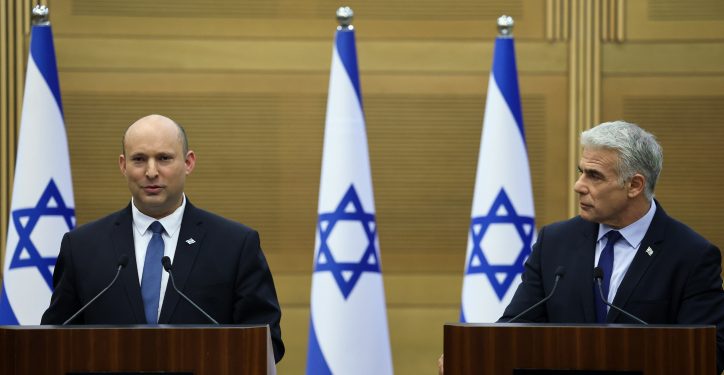The Bennet-Lapid government will have lasted only one year. The continued attacks of the opposition led by the Likud in order to bring it down eventually paid off. A third deputee of the right-wing party Yamina, Nir Orbach, has defuncted the ruling coalition, depriving it of its majority. After having decrared his intention to stop supporting the coalition if the “Judea-Samaria“ law was not voted, Orbach announced he would vote the proposal to dissolve the Knesset the Likud was planning to present that week. That law, constantly renewed every five years since 1967, and is due to expire at the end of June, aims to maintain the extension of criminal law and part of civil law to Israelis living in the West Bank, guaranteeing them to be treated as if they still lived in Israel, and to be able to benefit from their fundamental rights —such as the right to health insurance and the right to vote and to be elected— while those rights won’t be extended to Palestinians living in the same areas. The Jewish parties of the opposition having declared their intention to abstain, even though they share its goals, the vote of that law depended on the support of the Arab deputies of the Ra’am party member of the coalition, who were not ready to do it. The Labour party and the Meretz, ideologically opposed to that law, would have voted it in compliance with the coalition agreements where all parties had committed to maintaining the status quo on all topics on which they disagreed, like those related to occupation.
Informed of Orbach’s decision, Naphtali Bennett decided with Yair Lapid to call for the dissolution of the Knesset, so that “chaos does not settle in the country“ and that hundreds of thousands Israelis settled in the West Bank are not deprived of a status. Which won’t happen in case new elections take place since existing regulations will be automatically renewed.
In his address to the Knesset, Bennett gave a glowing account of the actions of his government, whose results are numerous. Of these, two will remain.
The first one, of which Bennett prided himself collectively on behalf of the eight parties of the coalition, is to have shown that, contrary to all predictions, this government, in spite of its divergences on many issues, had worked well. By promoting the culture of the “we“, he has helped to calm the public debate and he set out to solve the many problems left behind by the previous governments. Others leaders of that coalition, like Benny Gantz and Nitzan Horowitz, the leader of Meretz, praised this government’s action, the latter asserting that “it had saved the Israeli democracy and would be remembered for its accomplishments during many years ahead. At a time like ours, where in many liberal democracies it is more and more difficult to form coalition governments, that experience could serve as a model. And it could have lasted longer if it had not relied on a fragile coalition, consequence of the current electoral system in Israel.
The second result that will remain, which Mansour Abbas, leader of the Islamic party Ra’am, has mentioned during a TV interview, is the fact of having proved that an Arab party can be part of a government even with right-wing Jewish parties. Knowing that this choice corresponds to the expectations of the majority of Arab Israelis, he even said that “his party would also be part of the next coalition after the elections“. —According to a recent poll among the Arab population, more than 38 % wanted the actual coalition to remain, 35 % wanted the United Arab list, that is part of the opposition today, to join the coalition, and only 23 % were in favour of holding new elections.
During their joint address at the Knesset, Bennett and Lapid have shown great mutual respect. In accordance to agreements between them, Bennett declared that Lapid would become the Prime Minister of a transition government as soon as the dissolution would be voted, while waiting for the organization of new elections that should be held on October 25th.
Thus Israel embarks on a new electoral campaign, the fifth one since 2019. There is concern that, like in the past, key issues like the continuing occupation and the relationship with Palestinians won’t be referred to and that these future elections won’t be once again a confrontation between the pro-Bibi and the anti-Bibi. However, 4 months before the elections is, in terms of the Israeli calendar, an eternity during which many events may still happen. We will follow them with you.






